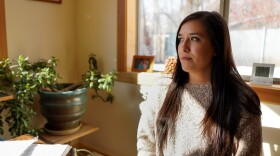-
In February, immigration agents arrested a man the federal government says is a danger to his community of Twisp in Washington’s Methow Valley. That same community fought to get their neighbor back.
-
The Courts Open To All Act effectively bans immigration enforcement agents from carrying out arrests inside courts and within one mile of state courthouses — unless they have a judicial warrant.
-
Mohanad Elshieky says Border Patrol agents racially profiled him and held him without cause. The comic, who was granted U.S. asylum in 2018, was on his way home to Portland after a gig in Pullman when the officers confronted him in Spokane.
-
Sixty Iranian-Americans say they were detained at the American border with Canada this weekend, according to CAIR, the Council on American Islamic Relations. Two other attorneys at the border, unrelated to CAIR, made similar observations. Customs and Border Protection denies those reports.
-
The report says the administration planned to separate as many as 26,000 children under the "zero tolerance" policy. More than 5,000 children were separated before it was ended by a judge.
-
Immigrant advocates are denouncing the proposal, arguing that collecting genetic information of border crossers could have implications for family members residing in the U.S.
-
Maria del Rayo Mendoza Garcia was arrested in March this year for allegedly committing a misdemeanor assault, according to the lawsuit. She was detained pending arraignment in front of a judge. But before that could happen, Mendoza’s status as an undocumented woman caught the eye of federal immigration authorities.
-
Administration officials credit a policy of returning asylum-seeking migrants to Mexico and an end to a policy referred to by critics as "catch and release."
-
The so-called "public charge" rule would limit the ability of immigrants to get green cards if are likely to use government benefits, such as SNAP or housing aid.
-
"Although the new federal regulation allows us to apply that all 2,000 miles along the Southwest border, we're not going to do that," Mark Morgan told NPR.
Play Live Radio
Next Up:
0:00
0:00
Available On Air Stations










